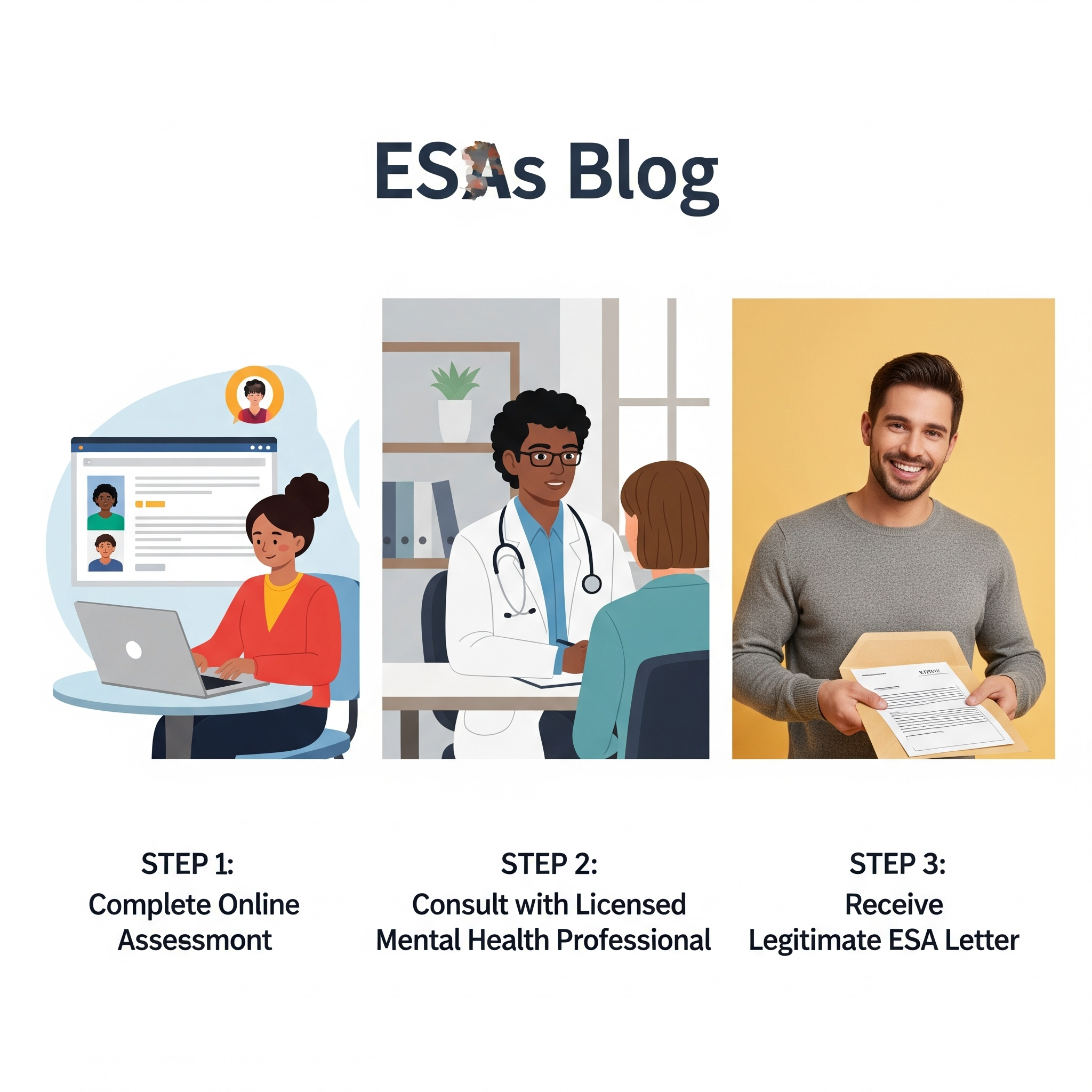College life, while exciting and transformative, can also be a significant source of stress, anxiety, and depression for many students. The pressures of academics, social adjustments, living away from home, and navigating new environments can all take a toll on mental well-being. For students managing a mental or emotional disability, an Emotional Support Animal (ESA) can provide invaluable comfort, stability, and companionship, helping to mitigate symptoms and foster a healthier college experience.
While universities often have “no pets” policies for on-campus housing, students with legitimate emotional support animals are typically protected under federal law. However, understanding your rights and responsibilities, and ensuring you have proper documentation, is crucial. At CertifyESA, we specialize in connecting individuals with licensed mental health professionals who can provide legitimate, APA-formatted ESA letters. This comprehensive guide will walk college students through everything they need to know about having an ESA in university housing, ensuring a smooth and successful accommodation process.
—
The Legal Foundation: The Fair Housing Act and ESAs in Housing
The primary law that protects a student’s right to have an ESA in university housing is the Fair Housing Act (FHA) (Fair Housing Act, 1968). This federal law prohibits discrimination in housing based on disability. Under the FHA, housing providers (which include colleges and universities that provide dormitories or other student housing) must make “reasonable accommodations” for individuals with disabilities.
Key points of the FHA regarding ESAs:
-
Reasonable Accommodation: Allowing an ESA in “no-pet” housing is considered a reasonable accommodation for a person with a mental or emotional disability who needs the animal’s presence to alleviate symptoms or provide support.
-
Disability-Related Need: The FHA requires a clear disability-related need for the ESA. This means there must be a connection between the student’s disability and the assistance the animal provides.
-
No Pet Fees/Deposits: Housing providers cannot charge additional pet fees or deposits for an ESA. ESAs are not considered pets under the FHA.
-
Breed/Weight Restrictions (Generally Not Applicable): While some universities may try to impose breed or weight restrictions, these are generally not permissible for ESAs unless the specific animal poses a direct threat to the health or safety of others, or would cause substantial damage to property (and this cannot be mitigated). Each case must be assessed individually.
-
Documentation Required: The FHA allows housing providers to request documentation from a licensed mental health professional (LMHP) confirming the disability and the disability-related need for the ESA. This is where a legitimate ESA letter from CertifyESA becomes essential.
It’s important to note that the FHA applies specifically to housing. It does not grant ESAs the same public access rights as service animals under the Americans with Disabilities Act (ADA) in other areas of campus (e.g., classrooms, libraries, dining halls), unless the university voluntarily permits it or it falls under a specific university policy.
—
What Qualifies a Student for an ESA in College Housing?
To qualify for an ESA in college housing under the FHA, a student must meet two criteria:
-
Have a Documented Disability: The student must have a mental or emotional disability that substantially limits one or more major life activities. This diagnosis must come from a licensed mental health professional (LMHP). Examples of qualifying conditions often include:
- Anxiety Disorders (e.g., Generalized Anxiety Disorder, Panic Disorder, Social Anxiety)
- Depression (Major Depressive Disorder, Persistent Depressive Disorder)
- Post-Traumatic Stress Disorder (PTSD)
- Obsessive-Compulsive Disorder (OCD)
- Bipolar Disorder
- Certain Phobias (e.g., agoraphobia)
-
Demonstrate a Disability-Related Need for the Animal: The LMHP must determine that the ESA is necessary to afford the student an equal opportunity to use and enjoy their housing. This means the animal’s presence must mitigate symptoms of the student’s disability. For example, an ESA might provide a calming presence during anxiety attacks, reduce feelings of loneliness and isolation associated with depression, or provide grounding support for PTSD.
A legitimate ESA letter from an LMHP confirms both of these points without disclosing the specific diagnosis, respecting the student’s privacy.
—
The ESA Letter: Your Essential Documentation
The cornerstone of a successful ESA accommodation request for college housing is a legitimate ESA letter. This letter must come from a licensed mental health professional (LMHP) who has an established therapeutic relationship with the student.
A valid ESA letter should include:
-
LMHP’s Official Letterhead: Including their name, title, contact information, and license number.
-
Confirmation of Disability: A statement that the student has a mental or emotional disability recognized by the DSM-5-TR (or other recognized diagnostic manual). The letter does not need to disclose the specific diagnosis.
-
Disability-Related Need for the ESA: A clear explanation that the ESA is necessary for the student’s mental health and well-being, and how the animal’s presence helps to alleviate symptoms or provide support for the disability.
-
Date of Issuance: The date the letter was written. Most universities will want to see an updated letter annually.
-
APA Format: CertifyESA ensures all letters are in APA format, which adds to their professional credibility and adherence to academic standards.
What to avoid (Red Flags of Scams):
- Instant Approvals: If a service promises an immediate letter without any real-time consultation with an LMHP.
- No LMHP Interaction: If you don’t actually speak (via telehealth or in-person) with a licensed professional.
- Guaranteed Approval: No LMHP can guarantee an ESA letter without a proper assessment of your individual needs.
- “Registration” or “Certification”: There is no official federal registry or certification for ESAs. Any site selling “ESA certificates” or “registrations” is fraudulent.
- Cheap Online Questionnaires Only: Legitimate assessments require more than a brief online survey.
—
Navigating University Policies: The Accommodation Process
While the FHA provides the legal framework, each university will have its own specific procedures for requesting and approving ESA accommodations.
General steps typically include:
-
Review University Housing Policies: Start by carefully reading your university’s housing contract, residence life policies, and disability services website regarding ESAs or “assistance animals.” They often have specific forms and deadlines.
-
Contact Disability Services: The Disability Services (or Student Accessibility Services) office is usually the first point of contact for requesting accommodations. They can guide you through the university’s specific process.
-
Submit Documentation: Provide your legitimate ESA letter from your LMHP, along with any university-specific forms.
-
Interview/Meeting: You may be required to meet with a representative from Disability Services or Residence Life to discuss your request and the role of your ESA.
-
Review and Approval: The university will review your request and documentation. If approved, they will provide you with official documentation of the accommodation.
Important Considerations for Universities:
-
Animal Behavior: Universities can deny an ESA if the specific animal poses a direct threat to the health or safety of others, or would cause substantial physical damage to property that cannot be reduced or eliminated by another reasonable accommodation. They can also require the ESA to be house-trained and under the control of its handler.
-
Student Responsibilities: You will be responsible for the care, feeding, grooming, and waste removal of your ESA. The university is not required to provide these services.
-
Impact on Others: While your ESA is primarily for your benefit, universities may consider whether the animal’s presence would impose an undue financial or administrative burden or fundamentally alter the nature of the housing. This is typically applied very narrowly.
-
Common Areas: While your ESA is permitted in your private living space (e.g., dorm room or apartment shared only with roommates who agree), its access to common areas within the dormitory (e.g., lounges, kitchens, hallways, bathrooms) may be subject to stricter rules, as these are considered shared spaces that might impact other students. Clarify this with your university.
-
Emotional Support Animals vs. Service Animals on Campus: Remember, the FHA’s protections for ESAs are primarily limited to housing. For access to other campus buildings like classrooms, libraries, or dining halls, only a service animal (trained to perform tasks) has guaranteed access under the ADA. Some universities may have more permissive policies for ESAs in certain non-housing areas, but this is at their discretion.
—
Benefits of Having an ESA in College
For many students, an ESA can be a game-changer for their mental health and overall college experience:
-
Reducing Stress and Anxiety: The constant, non-judgmental presence of an ESA can significantly lower stress levels, provide comfort during anxiety attacks, and create a sense of calm amidst academic pressure.
-
Combating Loneliness and Isolation: Adjusting to college can be isolating. An ESA offers unwavering companionship, reducing feelings of loneliness and providing a consistent source of comfort.
-
Promoting Routine and Responsibility: Caring for an animal instills a sense of routine and responsibility, which can be grounding for students struggling with depression or disorganization. Daily walks and feeding schedules can provide much-needed structure.
-
Encouraging Physical Activity: Many ESAs, especially dogs, require regular walks, which encourages their owners to get out, get fresh air, and engage in physical activity – all known mood boosters.
-
Providing a Sense of Security: For some students, particularly those with PTSD, the presence of an ESA can offer a profound sense of security and safety.
-
Social Catalyst: While not their primary role, an ESA can sometimes act as an icebreaker, facilitating positive social interactions with other students who are curious about or friendly towards animals.
—
CertifyESA: Your Partner in Academic Success and Well-being
Navigating the requirements for an Emotional Support Animal in college housing can seem daunting, but you don’t have to do it alone. CertifyESA is committed to supporting students by providing a legitimate and ethical pathway to obtaining your ESA letter.
We ensure that:
-
You Connect with Licensed Professionals: Our network includes licensed mental health professionals who are qualified to conduct comprehensive evaluations and determine your genuine need for an ESA.
-
The Process is Convenient and Confidential: Our telehealth platform allows for a discreet and efficient evaluation, respecting your privacy and making the process manageable even with a busy student schedule.
-
You Receive Clear Guidance: We provide transparent information about your rights and responsibilities, helping you understand the accommodation process and what to expect when living with an ESA in college housing.
—
Conclusion: Thriving with Your ESA in College
College is a time of immense growth, and having the right support system is crucial for thriving. For students managing mental or emotional disabilities, an Emotional Support Animal can be an invaluable asset, providing unconditional comfort and helping to navigate the unique challenges of university life. By understanding your rights under the Fair Housing Act and obtaining legitimate documentation from a licensed mental health professional, you can ensure a smooth accommodation process and enjoy the profound benefits your ESA brings.
Don’t let the complexities of navigating university policies deter you from seeking the support you need. CertifyESA is here to empower you with the proper documentation and knowledge, helping you unlock the full potential of your college experience with your cherished emotional support animal by your side.
—
References
Fair Housing Act, 42 U.S.C. § 3601 et seq. (1968).
U.S. Department of Housing and Urban Development (HUD). (2020, January 28). Assessing a Person’s Request to Have an Animal as a Reasonable Accommodation Under the Fair Housing Act. FHEO Notice: 2020-01.





